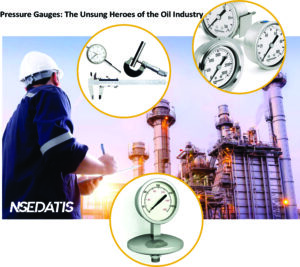Exploring Precision Instruments: The Key to Success in the Oil and Petrochemical Industry
Today, the oil and petrochemical industry stands as one of the largest industries in the world. In this context, precision instruments play a vital role in preventing significant losses and major disasters. Given their critical function, these tools are indispensable for maintaining operational integrity and safety.
In this article, we explore the various tools used in this industry and highlight their importance, with a particular focus on precision instruments. By the end, you will have a deeper understanding of their function and value. So, stay with us until the end and discover the fascinating world of precision instruments.
Pressure Gauges: The Unsung Heroes of the Oil Industry

Accordingly Pressure gauges are instruments that measure pressure in tanks and pipelines in real time. These tools are essential for ensuring the safe and efficient operation of processes. Some of the most common pressure gauges include:
– Transmitter: Converts fluid pressure into an electrical signal.
– Data Logger: Measures pressure and converts it into digital data.
– Pressure Gauge: A simple, cost-effective direct fluid pressure display tool.
Selecting the appropriate pressure gauge depends on the type of fluid, working pressure, and its application.
Flow Meters: Guardians of Fluid Flow

Flow meters measure the flow of liquids and gases in pipelines and tanks. In the petrochemical and oil industry, various flow meters are used, each designed for specific applications:
– Differential Pressure Flow Meter: Ideal for low-velocity fluids.
– Magnetic Flow Meter: Perfect for high-conductivity fluids.
– Turbine Flow Meter: Suitable for high-velocity fluids.
– Ultrasonic Flow Meter: Uses sound waves to measure flow.
– Coriolis Flow Meter: Operates based on the Coriolis effect.
Each type of flow meter has different pricing depending on its type and application.
Level Gauges: Watchful Eyes of Liquid and Solid Levels

Level gauges measure the level of liquids and solids in tanks and pipelines. Various types of level gauges are used in the industry, each designed for specific applications:
– Ultrasonic Level Gauge: Works by sending sound pulses and calculating the time difference of the pulses’ round trip.
– Capacitive Level Gauge: Suitable for measuring oil, water, and emulsifiers.
– Radar Level Gauge: Uses radar waves to measure the level.
– Radiometric Level Gauge: A non-contact system used when other level gauges are not feasible.
Temperature Measurement Tools: Essential Thermometers for Industries

Temperature measurement in industrial processes is crucial. Various tools exist for measuring temperature, each with unique features:
– Industrial Thermocouple: Suitable for different applications and temperatures.
– Thermometer: A handy device for local temperature display.
– Temperature Gauge: Displays temperature in both analog and digital formats.
– RTD Temperature Sensor: Measures temperature with a resistive output.
– Temperature Transmitter: Sends temperature signals in milliampere or volt formats.
Why Are Precision Instruments Essential in the Oil and Petrochemical Industry?
The use of precision instruments in the oil and petrochemical industries offers numerous advantages. Among these benefits are the following:
-
First and foremost, Process Control: Enhances performance and increases productivity by maintaining consistent operational conditions.
-
Firstly, Quality Control ensures products meet standards and specifications, thereby improving customer satisfaction and regulatory compliance.
-
Furthermore, Monitoring and Surveillance: Provides continuous process monitoring and early detection of problems, which helps prevent costly downtime.
-
Equally important, Safety Control: Ensures security and prevents accidents by allowing for real-time response to hazardous conditions.
-
Finally, Cost Reduction: Optimizes processes and reduces overall costs, making operations more economically sustainable.
Taken together, these advantages highlight the critical importance of precision instruments in maintaining efficiency, safety, and profitability across oil and petrochemical operations.
Conclusion
Above all, Precision instruments play a crucial role in the oil and petrochemical industry. To better understand their function, these tools are generally categorized into four main types: pressure measurement, flow measurement, level measurement, and temperature measurement. By classifying them this way, it becomes easier to implement targeted solutions for various industrial needs.
Moreover, utilizing these instruments aids in better process control, improved quality, precise monitoring and surveillance, enhanced safety, and reduced costs. As a result, plants can maintain operational stability and meet regulatory standards more effectively.
Ultimately, by leveraging these tools, the oil and petrochemical industry can continue its operations with greater confidence and increased efficiency.

